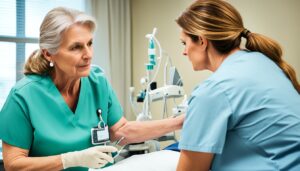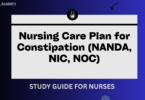You would not believe it but the employment of Adult Gerontology Acute Care Nurse Practitioners (AGACNPs) is expected to increase in the range of 44% by 2024 only. This is the implication of understanding just how crucial AGACNPs are to health care, especially as it relates to the elderly demographic.
The nature of healthcare is evolving, and the society is striving to provide care for older adults with chronic and acute conditions. In this aspect, AGACNPs are instrumental. They are endowed with certain skills that would make them attractive for a fulfilling contact profession.

Key Takeaways
- The need for AGACNPs has been internationally estimated to rise profoundly by 2024.
- Concerning GN trends, there are calls for acute care practices.
- AGACNP roles are evident in treatment options of chronic and Acute conditions in elderly patients.
- This nurse practitioner specialization is also a very promising and crucial type of occupation.
- This developing state of the healthcare field enhances the need for the skills provided by AGACNP professionals.
Introduction to Adult Gerontology Acute Care Nurse Practitioner
AGACNP stands for Adult Gerontology Acute Care Nurse Practitioner; and yes, an AGACNP is a specific type of nurse. They support elderly people experiencing chronic illnesses of one or another severity degree. Older patients are not forgotten and are provided with all the necessary medical assistance.

What is an Adult Gerontology Acute Care Nurse Practitioner?
AGACNPs have specific competencies in patient care in emergent conditions. They learn about controlling acute and chronic medical conditions of seniors and older people. This job is important in enabling elder people receive the care they require.
The Growing Demand in 2024
Again, there will be a need for more AGACNPs in 2024. This is because people are living longer and many have one form of chronic illness or the other. AGACNPs are pivotal in providing the right care to the elderly clients.
Roles and Responsibilities of an AGACNP
An essential professional for attending to the adulant and the elderly is an Adult Gerontology Acute Care Nurse Practitioner (AGACNP). They treat most of the emergency cases as well as long-term health illnesses. The employees also try their best to provide quality care with various services and integrating teamwork.
Primary Responsibilities
AGACNPs are characterized by the assessment of patients and identifying what is wrong with them. They prescribes treatment I, dispenses drugs, and perform some actions. These consider all of the patient’s needs and provide care based on the specific needs of the patient. Thus, they can assist patients within a short time and monitor their healthcare process.
Critical Care and Emergency Services
Emergency rooms and the critical care units usually are where AGACNPs are located. This they do while ensuring that they attend to patients who require their services urgently. They maintain critical illnesses and perform some interventions whenever necessary.
It also implies that they are in a good position to handle stress since such activities often pose stress factors. Their focus entails providing lightning fast care from very competent health care professionals. Such findings show a significance of cultural factors in care settings presided by nurse practitioners.

Collaboration with Healthcare Teams
However, caring for patients often means caring in teams; thus, AGACNPs work with other people. This involves interaction with a health care team of the doctor, the nurse and other personnel. Combined, they ensure that all the patients receive the best treatment.
Such teamwork assists the patient to regain their health and testifies to the general significance that AGACNPs offer to give full healthcare.
Educational Requirements and Certification
To become an Adult Gerontology Acute Care Nurse Practitioner, one needs effort and time to devote for studying. First, one has to earn a Bachelor of Science in Nursing or commonly known as BSN. Then, you need a Master of Science in Nursing (MSN) or Doctor of Nursing Practice (DNP) with a major in adult-gerontology acute care.
For one to be an advanced nurse, there is a requirement of doing a specific number of clinical hours. These hours also assist you in learning how to take good care of the patients.

Like other NPs, certification is crucial for AGACNPs and the key certifications include the certified nurse practitioner. There is an examination offered by organizations such as the American Nurses Credentialing center (ANCC) or the American Association of critical-care nurses (AACN). This shows you are competent and you will be adequately capable of managing patients.
There is also the factor of continuing education as a nurse. The sphere of health care evolves a lot. Staying updated assists the AGACNPs be able to provide the best care as they can. More classes, going to the workshops, and renewal of certification are some of the significant actions.
AGACNPs in Different Healthcare Settings
Places where Adult-Gerontology Acute Care Nurse Practitioners (AGACNPs) can work include. You can find them in hospitals, private practitioners’ offices, clinics and in nursing homes. Every centre is unique and so are the client’s requirement, and hence, AGACNPs adapt their abilities to the latter.
Hospital Environments
In hospitals they take care of urgent cases and emergency. The participate with many other healthcare workers to deliver crucial care. They ensure the patients receive appropriate medical care and assist other physicians to function cohesively.
Private Practices and Clinics

AGACNPs that are employed in private offices and clinics specialize in those services that do not require a client to be confined in the hospital. They diagnose patients, determine the problem, and hear to cure it. They also educate patients on how to maintain proper health and lifestyle and particularly how to live with chronic diseases.
Nursing Homes and Long-term Care
Such care is very relevant in places such as nursing homes, where AGACNPs are of considerable significance. The exhibits cater for the old patients and handle the complications associated with the seniority. They ensure elderly have the right care that they deserve in order to have a good quality life.
The Impact of Technology on AGACNP Practice in 2024
Healthcare is always changing. As such, the position of Adult Gerontology Acute Care Nurse Practitioners (AGACNPs) is also evolving. Technologies are changing the way that AGACNPs practice in the new generation; it is enhancing the patients’ care.
Telehealth and Remote Patient Monitoring
Telehealth is considered to be a major player that is shifting the dynamics for AGACNPs. This makes it possible for them to cover more patients, and care to be made easier. Thus, patients can be monitored from a distance using health informatics and this is quite easy.
This means, through home visits, constant vigil over these patient’s health can be made without many hospital visits by the AGACNPs. People who are ill receive their medical treatment and attend appointments without having to physically go to the hospital.
Advanced Diagnostic Tools
New tools are revolutionizing giving of acute care. By use of AGACNP technology, making of faster and effective diagnoses is enhanced. Strategically, more effective treatment plans can be encouraged for patients by AGACNPs, thus improving patient outcomes. This demonstrates that technology is somehow improving the lives of the patient.
Incorporation of health informatics and AGACNP technology is comparable to opening a new page in the treatment of elderly patients. It makes care well and results to better health status.
Challenges and Opportunities in 2024
Adult Gerontology Acute Care Nurse Practitioners (AGACNPs) have cause for celebration in 2024. It means it’s a large workload and the perfect opportunity which become one and the same. The healthcare has continued to transform at a very faster pace that calls for one to develop a good perception of it. Concerning the priority tasks necessary to build the effectiveness of AGACNPs, we will discuss what has to be done well.
Regulatory Changes
Before, in the year 2024, the AGACNPs will experience significant changes in the rules on the nursing profession. These changes might make their jobs easier or harder mobile computing can make their work easier as it provide teens with access to the internet at all times. This it what is expected of them to do in order to be in good stead with these changes. In this way, they can continue to provide good patient care since they are a health care facility, or some parts of it at least.
Addressing Workforce Shortages

AGACNPs are severely lacking, especially the ones that can help increase the number of patients. For this reason, the government and other stakeholders should plan and organize adequate workforce, especially skilled nurses, in collaboration with schools. There is also a necessity for new approaches to retaining nurses in this profession.
Opportunities for Professional Development
There is also a great opportunity for AGACNPs to advance in their careers. Through continuous education and improvement of their performance they are able to advance in their careers. The staff would want to be in professional groups / get more certifications perhaps to do even more good in health care.
Career Outlook and Salary Expectations
The employment prospects for the AGACNP career are good in 2024. There is increased demand for specialty nurses in the United States where AGACNPs are important for treatment of older persons and those in need of urgent care. Thus, the necessity for AGACNPs stays high because of the constant increase in the number of senior patients.
There are plenty of jobs open to AGACNPs. They are employed in hospitals, emergency facilities and in other facilities that clients deal with elderly patients. This means that they can choose the area of operation based on areas of interest and area of specialization. Since the process of healthcare evolution, AGACNPs will be of even higher significance, providing excellent opportunities for those who practice in this area.
Altogether, it reveals that the salaries for nurse practitioners in the field of AGACNPs are fairly well. According to the Bureau of Labor Statistics, third shift employees earn more than the average salary. Wages can vary due to the healthcare facility, the employee’s experience, and the type of the place. However, self-employed AGACNPs get a lot of money cumulatively.
Hence, the AGACNP career prospect is replete with monetary and personal gains. The implication of this is that as more persons turn older, AGACNPs will constantly have numerous opportunities for expansion and promotion. Becoming an AGACNP is also wise since job promises richness, stability and, therefore, is a smart choice for nurses.
Conclusion
The adult gerontology acute care nurse practitioners are significant players in today’s health care delivery. Precisely from this article I got to know what AGACNPs do, their roles, and areas of work. They are ahead in sectors such as patient care especially to the elderly.
To ensure the company continues being a frontrunner in the delivery of health care services, the AGACNPs need more education and certifications. They adopt fresh tools such as telehealth and other sophisticated devices to deliver care. Thus, the future may well be rosy for AGACNPs as they confront issues and develop in their profession.
On the same note, it is expected that in the future, AGACNPs will matter even more. And as healthcare undergoes transition, these attributes will assist enhance patients’ standard of care. These models shall be important in meeting the upsurge in demand for health care in 2024 and other subsequent years.
FAQ
On the same note, one may ask: An Adult Gerontology Acute Care Nurse Practitioner (AGACNP) is?
An AGACNP is a rather specific type of a staff member of a healthcare institution. It is for people who tend to have severe diseases or chronic diseases affecting adults and the elder people. This is because they are conversant with much of the topics concerning severe or chronic illness and elder care.
What are the factors which make there to be a growing need for AGACNPs by the year 2024?
There are more centenarians, more people developing chronic illnesses. In this regard, it means that there is absolutely higher demand for related or complementary services. Hospitals, clinics and any handling centre that deals with severe diseases cannot be crowded out of the main subject since AGACNPs are vital in providing this care and making patients recover.
What does an AGACNP do basically?
AGACNPs are involved in the diagnosis as well as the treatment of various major health complications. They are involved in providing critical care, and collaborate with other physicians to assist clients. They play a very crucial role in the management of care for the sick adult and the elderly with acute and chronic diseases.
What school preparation or licensure is needed to become an AGACNP?
In order to become an AGACNP one needs to have a special nursing degree on the master or doctorate level. You also have to clock yourself some clinical time and pass a test as well. Education in nursing should not stop there.
Where do AGACNPs practice, and with whom do they practice?
AGACNPs practice in many facilities including hospitals, clinics, and nursing homes. They are versatile and can provide care in various environments, thus catering to the need of the various places.
The case seeks to establish how the advancement in technology is influencing AGACNPs in the year 2024.
Technology is influencing the way AGACNPs practice. More so they tend to use telehealth and remote monitoring more than the other methods. Modern assistances and breakthroughs assist them to provide improved and more efficient health care.
Which hurdles and possibilities can be noted for AGACNPs in 2024?
Some of the problems affecting AGACNPs include; new rules, not enough workers. However, one gets an opportunity to advance in their career ladder and get a shot at leadership positions. The only thing I can ever remember is the fact that we should always be on the alert, or be particular about something.







